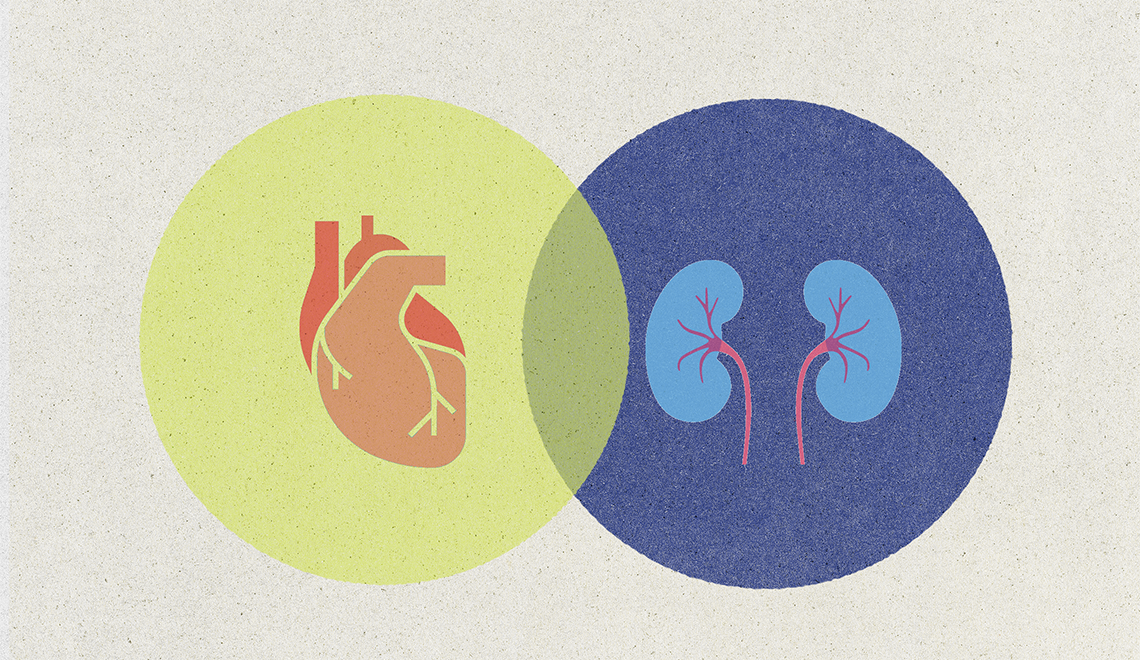AARP Hearing Center


Even if they seem relatively distant in their positions in our bodies and autonomous in their roles, our organs are intimately, intricately connected. The gut talks to the brain; the liver can affect the lungs; and the health of your heart can influence the health of your kidneys.
In fact, these last two — the heart and kidneys — are so closely intertwined that health experts have coined a new term to define patients who are at risk for their related illnesses. It’s called cardiovascular-kidney-metabolic syndrome, and research suggests it’s exceptionally common.
The American Heart Association says 1 in 3 U.S. adults have three or more risk factors for CKM syndrome, and it appears most adults are affected to some degree. In fact, a recent study published in the journal JAMA suggests nearly 90 percent of U.S. adults have some stage of CKM syndrome — a reflection of risk factors from being overweight to having chronic conditions like diabetes.
What is cardiovascular-kidney-metabolic syndrome?
Most people are familiar with heart disease, kidney disease, obesity and type 2 diabetes. These four health conditions are among the most common in the U.S., and they are especially prevalent in older adults.
Are You at Risk?
To help people understand where they are on the CKM health risk spectrum specifically for heart disease, the AHA has a calculator.
You plug in your sex, age, cholesterol, blood pressure, body mass index (BMI) and a few other details, and the tool spits out your estimated 10- and 30-year percentage risk for developing cardiovascular disease or heart failure.
But they’re also closely connected, and CKM syndrome — a concept recognized and a term first coined in an advisory by the American Heart Association last fall — encompasses their overlap. To put it another way: If you have a metabolic disorder (metabolic just has to do with getting energy from food) like type 2 diabetes or obesity, your risk goes up for either developing heart and kidney problems, or worsening them.
Chiadi Ndumele, an associate professor of medicine and director of obesity and cardiometabolic research at Johns Hopkins University, says CKM syndrome is “a really potent driver” of premature deaths, including from heart disease. Cardiovascular deaths — once on the decline — are now increasing, evidence suggests. “This is thought to be all secondary to CKM syndrome,” says Ndumele, who coauthored the AHA advisory.
The snowball effect
The causes and effects of CKM syndrome are wide-ranging. It’s not a simple flowchart but more of a spiraling storm — such as when obesity, a major cause of kidney disease, leads to a cascade of metabolic issues.
“When a kidney is damaged, by diabetes per se, or hypertension in particular, it produces a number of other abnormalities that affect the whole body — particularly the cardiovascular system,” says Katherine Tuttle, , professor of medicine in the division of nephrology at the University of Washington School of Medicine, and a coauthor of the AHA advisory. “It causes inflammation, it raises blood pressure, it makes people more resistant to insulin, it makes the lipid disorders worse.”



































































More From AARP
8 Exercises to Help You Lose Weight
These effective workouts can help you burn caloriesBest Diet for Your Heart
The American Heart Association scores popular diets
19 Heart-Smart Choices to Make Throughout Your Day
Treat your heart right morning, noon and night with these easy, research-proven, expert-endorsed ideas
Recommended for You